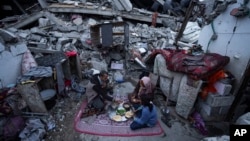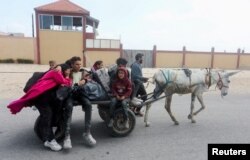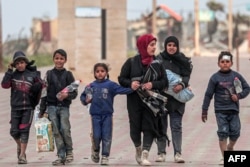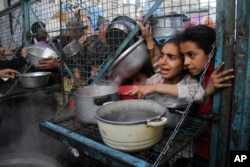U.S. President Joe Biden spoke Monday with Israeli Prime Minister Benjamin Netanyahu for the first time in more than a month, voicing new concerns about Israel’s conduct of its war in Gaza against Hamas militants and its plan for a ground attack on the southern city of Rafah near the Egyptian border.
White House national security adviser Jake Sullivan said Biden told the Israeli leader in a phone call, “We share the goal of defeating Hamas. We just believe you need a coherent and sustainable strategy to make that happen."
Sullivan called Netanyahu’s plan for a ground offensive “smashing into” Rafah a “mistake.” More than a million Palestinians are sheltering in makeshift tents and structures there to try to protect themselves from the ravages of the war, many on orders from the Israeli military to abandon their homes in the northern reaches of Gaza as Israel continues to attack that region.
Israel has promised to move the Palestinians in Rafah to an undisclosed location for their safety before any attack on the region but has given no public indication of where that would be.
At Biden’s request, Sullivan said Netanyahu agreed to send a team of Israeli officials to Washington in the coming days, possibly early next week, to discuss Israel’s plans for any attack on Rafah and safeguards for Palestinians sheltering there.
Sullivan said the U.S. “fully expects” Israel to not initiate any attack on Rafah until after the discussions in Washington.
In a statement after the Biden-Netanyahu call, the Israeli leader’s office said, “We talked about the latest developments in the war, including Israel’s commitment to achieving all the goals of the war — the elimination of Hamas, the release of all our hostages, and the promise that Gaza will no longer pose a threat to Israel — while providing the necessary humanitarian aid that helps achieve these goals.”
Rising frustration
The Biden phone call with Netanyahu came as the U.S. leader has voiced growing frustration at Israel’s conduct of the war, the ever-growing death toll of Palestinian civilians and the lack of humanitarian aid reaching famished people in Gaza.
Over the weekend, Biden embraced the general tenor, if not all the specifics, of a speech last week by Senate Majority Leader Chuck Schumer, the highest-ranking Jewish leader in the U.S., saying Netanyahu had “lost his way” in overseeing the war and calling for new elections.
Netanyahu retorted Sunday in a CNN interview that Schumer’s call for a snap election was a “totally inappropriate” demand, a stance some U.S. Republicans echoed in attacking the Senate Democratic leader’s speech criticizing Israel.
Negotiators for Israel and Hamas are headed to Qatar to try again this week to reach agreement on a six-week cease-fire and the release of 40 or so of the estimated 100 hostages Hamas is still holding in exchange for dozens of Palestinians Israel has jailed.
But Sullivan said of the truce negotiations: "So far, this deal has been more elusive than we had hoped."
On the battlefield, Israel’s military said Monday that it was conducting an operation at the Shifa Hospital in Gaza City, an area where it came under international criticism for a November raid.
Israel Defense Forces spokesman Rear Admiral Daniel Hagari said in a statement that Israeli forces were acting Monday because senior Hamas officials were using the hospital to command attacks against Israel.
“We will conduct this operation with caution and care while ensuring that the hospital continues its important function,” Hagari said.
Airstrikes, tanks
Witnesses reported airstrikes near the hospital, which is the largest in the Gaza Strip, as well as the presence of Israeli tanks.
European Union foreign policy chief Josep Borrell said Monday that Israel “is provoking famine” in Gaza and using starvation “as a weapon of war.”
"In Gaza, we are no longer on the brink of famine, we are in a state of famine, affecting thousands of people," Borrell told a conference on humanitarian aid for Gaza in Brussels.
Israeli Foreign Minister Israel Katz said his government “allows extensive humanitarian aid into Gaza by land, air and sea for anyone willing to help,” and he accused Hamas militants of “violently disrupting aid convoys.”
Humanitarian groups have frequently cited challenges in getting aid into Gaza, including being blocked by Israel and being unable to access areas inside Gaza because of the conflict.
The war started with Hamas' October 7, 2023, terror attack on Israel that killed 1,200 people, according to Israeli tallies, and the Hamas capture of about 250 hostages. Health officials in Gaza say Israel’s counteroffensive has killed nearly 32,000 people, the large majority of whom were women and children, while displacing more than half the Gaza population of 2.3 million and leveling much of the territory’s infrastructure and homes.
VOA's Anita Powell and Patsy Widakuswara contributed to this report. Some information came from Reuters, The Associated Press and Agence France-Presse.










